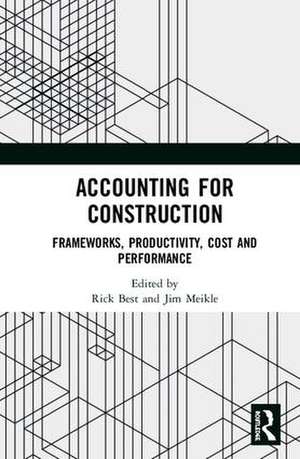Accounting for Construction: Frameworks, Productivity, Cost and Performance
Editat de Rick Best, Jim Meikleen Limba Engleză Hardback – 11 apr 2019
Taken together, the two volumes collate a range of topics that are only addressed, if addressed at all, in occasional academic papers and the publications of bodies such as national statistical offices and the World Bank. Accounting for Construction presents international examples from the UK, Australia and New Zealand and from both academic and professional contributors.
This book is essential reading for all researchers and professionals interested in construction economics, construction management, and anyone interested in how the construction industry affects the global economy in ways previously under-represented in the literature.
| Toate formatele și edițiile | Preț | Express |
|---|---|---|
| Paperback (1) | 436.14 lei 43-57 zile | |
| CRC Press – 30 iun 2021 | 436.14 lei 43-57 zile | |
| Hardback (1) | 1115.33 lei 43-57 zile | |
| CRC Press – 11 apr 2019 | 1115.33 lei 43-57 zile |
Preț: 1115.33 lei
Preț vechi: 1360.16 lei
-18% Nou
Puncte Express: 1673
Preț estimativ în valută:
213.49€ • 231.97$ • 179.44£
213.49€ • 231.97$ • 179.44£
Carte tipărită la comandă
Livrare economică 21 aprilie-05 mai
Preluare comenzi: 021 569.72.76
Specificații
ISBN-13: 9781138293977
ISBN-10: 1138293970
Pagini: 256
Ilustrații: 18
Dimensiuni: 156 x 234 x 16 mm
Greutate: 0.63 kg
Ediția:1
Editura: CRC Press
Colecția Routledge
ISBN-10: 1138293970
Pagini: 256
Ilustrații: 18
Dimensiuni: 156 x 234 x 16 mm
Greutate: 0.63 kg
Ediția:1
Editura: CRC Press
Colecția Routledge
Public țintă
PostgraduateCuprins
1. The challenges of measuring and accounting for construction (RICK BEST AND JIM MEIKLE)
2. Accounting for the built environment (GERARD DE VALENCE)
3. Comparing construction in national industrial classification systems (GERARD DE VALENCE)
4. The challenges of measuring British construction output (BRIAN GREEN)
5. Measuring construction industry activity and productivity: the impact of the shadow economy (WILL CHANCELLOR, MALCOLM ABBOTT AND CHRIS CARSON)
6. Productivity and levels of output in the construction industry (WILL CHANCELLOR, MALCOLM ABBOTT AND CHRIS CARSON)
7. Measuring capital productivity in construction (MICHAEL REGAN)
8. Cost ratios and technology choice (TOONG KHUAN CHAN)
9. A review of the 2011 construction survey and results from the World Bank International Comparison Program (JIM MEIKLE)
10. Comparative construction cost data for industry: a case study of Turner & Townsend’s experience (GARY EMMETT AND CRAIG LANGSTON)
11. Applications of big data to construction (D’MARIS COFFMAN AND JOHN KELSEY)
12. A proposed framework for measuring future construction industry performance (DAVID CHANDLER, MARY HARDIE, SRINATH PERERA AND CRAIG LANGSTON)
2. Accounting for the built environment (GERARD DE VALENCE)
3. Comparing construction in national industrial classification systems (GERARD DE VALENCE)
4. The challenges of measuring British construction output (BRIAN GREEN)
5. Measuring construction industry activity and productivity: the impact of the shadow economy (WILL CHANCELLOR, MALCOLM ABBOTT AND CHRIS CARSON)
6. Productivity and levels of output in the construction industry (WILL CHANCELLOR, MALCOLM ABBOTT AND CHRIS CARSON)
7. Measuring capital productivity in construction (MICHAEL REGAN)
8. Cost ratios and technology choice (TOONG KHUAN CHAN)
9. A review of the 2011 construction survey and results from the World Bank International Comparison Program (JIM MEIKLE)
10. Comparative construction cost data for industry: a case study of Turner & Townsend’s experience (GARY EMMETT AND CRAIG LANGSTON)
11. Applications of big data to construction (D’MARIS COFFMAN AND JOHN KELSEY)
12. A proposed framework for measuring future construction industry performance (DAVID CHANDLER, MARY HARDIE, SRINATH PERERA AND CRAIG LANGSTON)
Notă biografică
Rick Best is Associate Professor of Construction Management and Economics at Bond University. He has produced numerous book chapters and papers over a 25-year career as an academic, as well co-editing four books and co-authoring one quantity surveying textbook. He was the founding director of the Centre for Comparative Construction Research. His research over the past 10 years has been focused on the problems associated with making valid comparisons of construction industries across countries and has contributed to the development of a construction data collection project within the International Comparison Program.
Jim Meikle has a part-time chair in the economics of the construction sector at the Bartlett School of Construction and Project Management, University College London, and is an adjunct professor at Bond University. He retired as a partner of Davis Langdon LLP in 2005, and since then he has worked as an independent consultant with UK government departments and agencies, foreign governments, international organizations including the EU, the World Bank and the African Development Bank, and private clients. His main interests are international comparisons construction industry policy, construction data, construction productivity and construction professional services.
Jim Meikle has a part-time chair in the economics of the construction sector at the Bartlett School of Construction and Project Management, University College London, and is an adjunct professor at Bond University. He retired as a partner of Davis Langdon LLP in 2005, and since then he has worked as an independent consultant with UK government departments and agencies, foreign governments, international organizations including the EU, the World Bank and the African Development Bank, and private clients. His main interests are international comparisons construction industry policy, construction data, construction productivity and construction professional services.
Descriere
Accounting for Construction follows on from Measuring Construction, expanding the range of related topics to include, inter alia, shadow economies, accounting for informal construction and the treatment of the built environment sector in national accounts.
